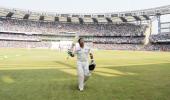In the absence of the Army, the BCCI may not consider a depleted Services side worthy of participation at the national level, notes Air Marshal Pramod Vasant Athawale (retd).

The World Cup 2023 has reiterated a fact that cricket is a binding force in India especially when our team does well.
Therefore, an average Indian may find it surprising that the Indian Army has recently said 'NO' to cricket as a sport within the Army.
As such, the Services team for the recent T20 tournament comprised of only the Indian Navy and Indian Air Force players.
This is likely to happen for all national tournaments conducted by the BCCI, including the prestigious Ranji Trophy.
It is feared that in due course the Navy and Air Force may also decide to stop participating in cricket tournaments outside their individual service.
Even if they wish to continue, in the absence of the Army, the BCCI may not consider a depleted Services side worthy of participation at the national level.
The current services cricketers are disappointed. Those who were enrolled as cricketers and who have rarely been with any unit are especially disheartened to see their (cricketing) careers finished.
Many veteran cricketers also are emotional about this development.
One of them exclaimed, "Sadly, there will be no Services cricketers tomorrow!"
Veteran cricketers see themselves getting completely cut off from their parent cricket board.
Well, let us look at this development dispassionately. It appears to be a well thought out decision.
Just like the military is kept away from politics, it would be in the interest of the armed forces to keep this business, 'Cricket' away from their personnel.
Some of the major changes since 1990s about the character of cricket and a cricketer, will indicate the likely rationale behind Army's decision:
- Until the 1980s, there were only two national tournaments, the Ranji Trophy and Duleep Trophy.
For the Duleep Trophy, only a few Services cricketers represented the North Zone. - As such, a regular Services cricketer was on sports duty for about 3 months, including Inter Unit, Inter Command, Inter Services, and the Ranji Trophy.
He had to get back to his unit and get more committed to work to compensate for his absence.
A cricketer often compromised his annual leave as a compensation for his absence for cricket. - Now, cricketers are permanently attached only to play cricket and are engaged round the year in national level tournaments.
Besides their total absence from the units, they do not also participate in local Inter Unit games, which are meant to build team spirit and morale in units. - Since the inception of the Ranji Trophy in 1949-1950, five Army officers and two from the Air Force played for India until 1961.
All of them were acclaimed as highly professional military men. We continued to have great cricketers. - Unfortunately, none qualified to don the India blazer after 1961 as cricket demanded more time on the field, which was not possible for professional military men.
- Services cricketers played predominantly based on individual talent till the turn of the century.
They were military men first, cricketers next. However, growing professionalism and money in cricket began demanding 365 days commitment to the game.
Today, a cricketer aiming to play at the national level must be a professional cricketer and cricketer alone.
The military tag is only a matter of one's self-esteem without making any contribution to his basic duties as a soldier, seaman, or airman. - Besides the above, one of the most vital aspects is that cricket is more a BIG BUSINESS than a sport.
With a single IPL contract, a cricketer would make far more money than his colleagues would earn in their whole careers. - This would surely upset the balance in the military and be counterproductive for maintenance of team spirit and morale.
We, the veteran cricketers have a reason to feel disappointed.
However, I am sure that tomorrow none of us would wish to see a veteran Services cricketer, who has not been a worthy military man first.
Cricket within the armed forces without professional cricketers shall be far more enjoyable and team builder than at present.
Jai Hind!
Air Marshal P V Athawale (retd) captained the Indian Air Force cricket team for two years and once played for the Services in the Ranji Trophy.
Feature Presentation: Aslam Hunani/Rediff.com











